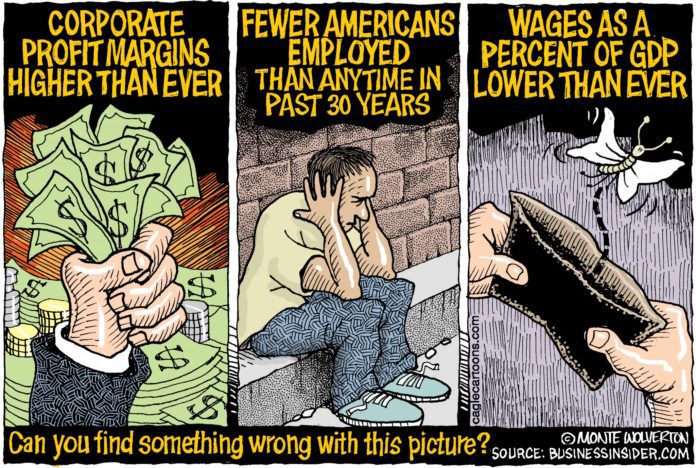BY RALPH NADER
What would happen if we asked the executives of the giant U.S. corporations, whose products constantly surround us, to show some corporate patriotism?
After all, General Electric, DuPont, Citigroup, Pfizer and others demand that they be treated as “persons” under our Constitution and our laws. And they expect unfiltered loyalty from American workers even to the point of blocking the organization of unions so workers can band together for collective bargaining.
Moreover, many of these corporations expect to be bailed out by American taxpayers when they are in trouble, and they regularly receive a covey of direct and indirect government subsidies, giveaways and complex handouts.
Some of them pay no federal income taxes year after year, and a few game the tax laws to receive additional money back from the U.S. Treasury. Historically, the U.S. Marines and other U.S. armed forces have risked their lives to protect or protect these corporations’ overseas interests by invading or menacing numerous countries.
So it is reasonable for the American people to expect some reciprocity from these immense corporate entities that were born in the U.S. and rose to their economic prowess on the backs of American workers. The bosses of these companies believe they can have it both ways – getting all the benefits of their native country while shipping whole industries and jobs to communist and fascist regimes abroad that keep their workers in serf-like conditions.
The first test as to whether these U.S. companies have any allegiance to the U.S. and its communities is to demand that CEOs stand up at their annual shareholders meetings and pledge allegiance in the name of their corporation, not their boards of directors, “to the flag of the United States of America,” ending with that ringing phrase, voiced by millions of Americans daily, “with liberty and justice for all.”
More than 70 years ago, a famous Marine general, the double Congressional Medal of Honor awardee Smedly Butler, said his Marines were ordered to make sure the flag followed U.S. companies from Central America to Asia.
In the past, the lack of allegiance was shockingly callous. DuPont and General Motors worked openly with fascist Germany and its companies before World War II and did not sever all dealings when hostilities started.
About 15 years ago, I sent letters to the CEOs of the top 100 largest U.S. chartered corporations asking that they pledge allegiance to our country in the name of their company at their annual shareholders meetings. Their responses were instructive. Many said they would review the request; others turned it down, while some were ambiguous, misconstruing the request as being directed to their boards of directors instead of their U.S. chartered corporate entity.
Walmart replied that they would “give it every consideration.” Federated Department Stores expressly thought it was a good suggestion. Citicorp [now Citigroup] wrote that it is “not our practice to respond.”
Time for an update. I’ve just sent letters to 20 of the largest U.S. chartered companies renewing the request for the pledge. They include Exxon Mobil, Walmart, Chevron, General Motors, General Electric, Ford Motor, AT&T, Bank of America, Verizon Communications, J.P. Morgan Chase, Apple, CVS Caremark, IBM, Citigroup and Cardinal Health.
Imagine the CEOs of General Motors [or Exxon Mobil, Citigroup, Bank of America, etc.] pledging allegiance “to the Flag of the United States of America and the Republic for which it stands, one Nation under God, indivisible, with liberty and justice for all.”
You may wish to contact these companies and urge their CEOs to take the pledge. This effort needs your participation as consumers, workers, taxpayers or shareholders. It opens up a long-overdue discussion about corporate patriotism and what it all should mean.
As conservative author Patrick Buchanan wrote some years ago: “If they [large U.S. corporations] are not loyal to us, why should we be loyal to them?”
Nader.org







